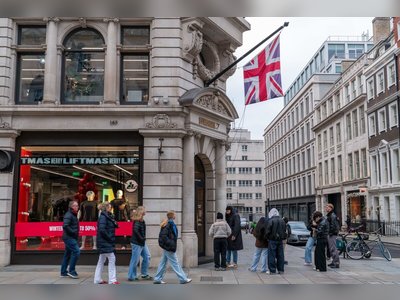
UK Advertising Watchdog Bans Ads Depicting Women as Sexual Objects in Mobile Games
Investigation reveals harmful content in mobile gaming advertisements prompting action from the Advertising Standards Authority.
An investigation by the UK Advertising Standards Authority (ASA) has led to the banning of several mobile game advertisements that depict women in a sexualized manner, utilizing graphic and non-consensual themes.
The ASA utilized avatars to emulate the browsing behaviors of different gender and age demographics, which monitored advertisements while mobile games were active, identifying breaches of UK advertising codes.
While the majority of the 5,923 advertisements reviewed were compliant with established guidelines, the ASA found eight that included content described as 'shocking' and harmful towards women.
Among these were advertisements for an artificial intelligence chatbot application, Linky: Chat With Characters AI, which featured a woman in suggestive attire engaging in a conversation about ending a relationship.
The ad included animated scenarios with characters exhibiting traits characterized as “obsessively possessive” and “aggressively jealous,” with graphic language describing forceful actions and implying a lack of consent.
Another advertisement, linked to an interactive romance story titled My Fantasy, depicted animated sequences where a woman is confronted and suggested to engage in non-consensual activities.
The available choices presented to viewers included options that implied a lack of consent.
Additionally, three advertisements for Love Sparks: Dating Sim were flagged, shown to specific avatars of both female children and adult males.
These included various suggestive depictions, including animations of women and phrases that reinforced the objectification of female characters, such as 'punish me … please'.
The ASA described these portrayals as employing 'stereotypical sexual objects using tropes from pornography'.
The ASA has banned these eight advertisements and issued warnings to their creators, reinforcing that although such instances were infrequently seen in comparison to the total number of ads served, any harmful or degrading portrayal of women is unacceptable.
The governing body maintains a zero-tolerance policy for such content.
A study published in conjunction with these findings revealed that nearly half of UK consumers have concerns regarding the portrayal and objectification of women in advertising.
Conducted by YouGov, the survey encompassed 6,500 respondents, showing that 45% expressed unease with idealized body images of women in advertisements, and 44% voiced concerns about the objectification of women and girls.
This latest action follows the ASA's ongoing efforts to curb misleading representations in advertising since it enacted stricter regulations regarding gender representation in 2019, a response to public outcry stemming from controversial advertisements, notably one from 2015 for a weight-loss product that claimed to help women achieve a 'beach body ready' appearance.
The ASA utilized avatars to emulate the browsing behaviors of different gender and age demographics, which monitored advertisements while mobile games were active, identifying breaches of UK advertising codes.
While the majority of the 5,923 advertisements reviewed were compliant with established guidelines, the ASA found eight that included content described as 'shocking' and harmful towards women.
Among these were advertisements for an artificial intelligence chatbot application, Linky: Chat With Characters AI, which featured a woman in suggestive attire engaging in a conversation about ending a relationship.
The ad included animated scenarios with characters exhibiting traits characterized as “obsessively possessive” and “aggressively jealous,” with graphic language describing forceful actions and implying a lack of consent.
Another advertisement, linked to an interactive romance story titled My Fantasy, depicted animated sequences where a woman is confronted and suggested to engage in non-consensual activities.
The available choices presented to viewers included options that implied a lack of consent.
Additionally, three advertisements for Love Sparks: Dating Sim were flagged, shown to specific avatars of both female children and adult males.
These included various suggestive depictions, including animations of women and phrases that reinforced the objectification of female characters, such as 'punish me … please'.
The ASA described these portrayals as employing 'stereotypical sexual objects using tropes from pornography'.
The ASA has banned these eight advertisements and issued warnings to their creators, reinforcing that although such instances were infrequently seen in comparison to the total number of ads served, any harmful or degrading portrayal of women is unacceptable.
The governing body maintains a zero-tolerance policy for such content.
A study published in conjunction with these findings revealed that nearly half of UK consumers have concerns regarding the portrayal and objectification of women in advertising.
Conducted by YouGov, the survey encompassed 6,500 respondents, showing that 45% expressed unease with idealized body images of women in advertisements, and 44% voiced concerns about the objectification of women and girls.
This latest action follows the ASA's ongoing efforts to curb misleading representations in advertising since it enacted stricter regulations regarding gender representation in 2019, a response to public outcry stemming from controversial advertisements, notably one from 2015 for a weight-loss product that claimed to help women achieve a 'beach body ready' appearance.











